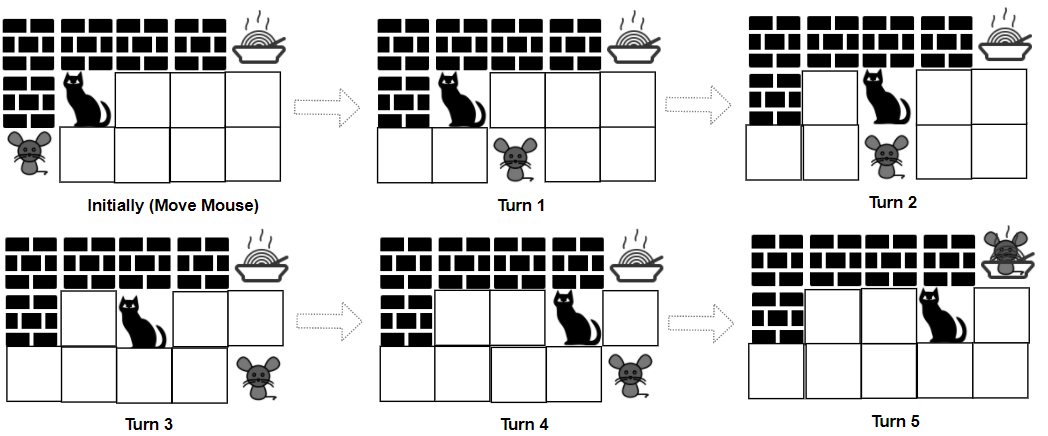Cat and Mouse II
A game is played by a cat and a mouse named Cat and Mouse.
The environment is represented by a grid of size rows x cols, where each element is a wall, floor, player (Cat, Mouse), or food.
- Players are represented by the characters 'C'(Cat),'M'(Mouse).
- Floors are represented by the character '.' and can be walked on.
- Walls are represented by the character '#' and cannot be walked on.
- Food is represented by the character 'F' and can be walked on.
- There is only one of each character 'C', 'M', and 'F' in grid.
Mouse and Cat play according to the following rules:
- Mouse moves first, then they take turns to move.
- During each turn, Cat and Mouse can jump in one of the four directions (left, right, up, down). They cannot jump over the wall nor outside of the grid.
- catJump, mouseJump are the maximum lengths Cat and Mouse can jump at a time, respectively. Cat and Mouse can jump less than the maximum length.
- Staying in the same position is allowed.
- Mouse can jump over Cat.
The game can end in 4 ways:
- If Cat occupies the same position as Mouse, Cat wins.
- If Cat reaches the food first, Cat wins.
- If Mouse reaches the food first, Mouse wins.
- If Mouse cannot get to the food within 1000 turns, Cat wins.
Given a rows x cols matrix grid and two integers catJump and mouseJump, return true if Mouse can win the game if both Cat and Mouse play optimally, otherwise return false.
Example 1:

Input: grid = ["####F","#C...","M...."], catJump = 1, mouseJump = 2 Output: true Explanation: Cat cannot catch Mouse on its turn nor can it get the food before Mouse.
Example 2:

Input: grid = ["M.C...F"], catJump = 1, mouseJump = 4 Output: true
Example 3:
Input: grid = ["M.C...F"], catJump = 1, mouseJump = 3 Output: false
Example 4:
Input: grid = ["C...#","...#F","....#","M...."], catJump = 2, mouseJump = 5 Output: false
Example 5:
Input: grid = [".M...","..#..","#..#.","C#.#.","...#F"], catJump = 3, mouseJump = 1 Output: true
Constraints:
- rows == grid.length
- cols = grid[i].length
- 1 <= rows, cols <= 8
- grid[i][j] consist only of characters 'C', 'M', 'F', '.', and '#'.
- There is only one of each character 'C', 'M', and 'F' in grid.
- 1 <= catJump, mouseJump <= 8
Solution:
bfs does not work because we can't guarantee optimized moves
DFS:
class Solution {
int m, n;
char[][] grid;
int mJump, cJump;
private final int[][] dirs = new int[][]{{1, 0}, {-1, 0}, {0, 1}, {0, -1}};
public boolean canMouseWin(String[] gridString, int catJump, int mouseJump) {
m = gridString.length;
n = gridString[0].length();
mJump = mouseJump;
cJump = catJump;
int ci = 0, cj = 0, mi = 0, mj = 0;
grid = new char[m][n];
for (int i = 0; i < m; i ++) {
grid[i] = gridString[i].toCharArray();
for (int j = 0; j < n; j ++) {
char c = grid[i][j];
if (c == 'M') {
mi = i;
mj = j;
} else if (c == 'C') {
ci = i;
cj = j;
}
}
}
return dfs(0, mi, mj, ci, cj, new Boolean[71][m][n][m][n]);
}
private boolean dfs(int turn, int mi, int mj, int ci, int cj, Boolean[][][][][] dp) {
if (mi == ci && mj == cj) return false;
if (turn >= 70) return false;
if (grid[mi][mj] == 'F') return true;
if (grid[ci][cj] == 'F') return false;
if (dp[turn][mi][mj][ci][cj] != null) return dp[turn][mi][mj][ci][cj];
boolean win = false;
if (turn % 2 == 0) {
// mouse
List<int[]> next = move(mi, mj, mJump);
for(int[] n : next) {
if (dfs(turn + 1, n[0], n[1], ci, cj, dp)) {
win = true;
break;
}
}
} else {
win = true;
// cat
List<int[]> next = move(ci, cj, cJump);
for(int[] n : next) {
if (!dfs(turn + 1, mi, mj, n[0], n[1], dp)) {
win = false;
break;
}
}
}
dp[turn][mi][mj][ci][cj] = win;
return win;
}
private List<int[]> move(int i, int j, int jump) {
List<int[]> res = new ArrayList<>();
res.add(new int[]{i, j});
for(int[] d : dirs) {
for(int s = 1; s <= jump; s ++) {
int ni = i + s * d[0];
int nj = j + s * d[1];
if (ni < 0 || ni >= m || nj < 0 || nj >= n) break;
// cannot jump #
if (grid[ni][nj] == '#') break;
res.add(new int[]{ni, nj});
}
}
return res;
}
}